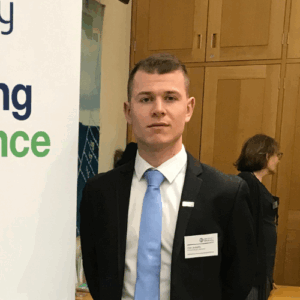
Cian Sutcliffe
PhD Researcher
Institute for Precision Health, University of Leicester
Choosing what degree to study or which field you’d like to work in? The Physiological Society can support you with your career development. Cian Sutcliffe (University of Leicester, UK) shares the experiences and funding that led him to a sport science project and a research opportunity with the European Space Agency. Read his blog about the skills, training and network opportunities gained by joining The Physiological Society.
The snowball effect
The first time I heard about The Society, I was a second-year undergraduate. My lecturer emailed our class about a paid research opportunity in the summer that was sponsored by The Society. The project looked at a new dietary supplement in competitive cycling. I wanted to work as a Performance Scientist with professional cyclists, so this experience sounded ideal for my career (and the pay helped too). After filling out one short form, I was selected!
During my Master’s, I bought a heavily discounted ticket to a Society conference. I was applying to PhDs at the time and a lot of the supervisors were attending this conference. I took part to chat to the supervisors and their students, learning about their research and what it was like to be a PhD student. I got advice from an American cardiologist who knew a group I was about to perform my thesis with. As an Early Career Representative for The Society, I even had a lecturer email me to ask about my work with The Society and offer me a PhD.
Later that year, I applied for a Professional Development Award to perform research on astronauts with the European Space Agency. I would use cutting-edge equipment that only existed in Germany and meet scientists from Europe and NASA. My application was successful, though unfortunately this research was delayed and clashed with my upcoming PhD. However, I can use the award for a future opportunity, so plan to visit a lab abroad later in my PhD.
While one of these experiences alone may not have changed my future, all of them together have shaped my understanding of science, introduced me to many international researchers from various fields, and funded opportunities that have opened doors I never thought possible. This is ‘The Snowball Effect’ that students often underappreciate.
Student benefits
So, why join The Society? The first reason is to expand your network – something that sounds painfully generic to young students. “I’m only a student; I don’t need a professional network for years!” To a certain extent, you are right, but things change fast as you look toward further education or joining the workforce. The second reason to join is more practical, with discounts on books, conferences, workshops, and training. You can also apply for grants to attend events.
Expert career advice and training resources
After graduation, it is quite common for students to drop communication with their classmates or lecturers. Meaning aside from friends and family, you might not have anyone to speak to about your future in physiology. While members of The Society may move jobs and geographies, most remain part of The Society itself.
The ability to get expert career advice from academics in a wide variety of research areas, career stages and geographical locations is invaluable as a student. You might wonder what it’s like to work as a scientist in a certain field or how to go about choosing a specific degree course. There is no better way to find out than by speaking to those who have done it before you!
Thanks to its network of over 2000 physiologists, you can ask members anything from what it’s like to be a researcher to how a certain physiological process works. You can also find discipline specific advice as members work in a range of fields including neurology, metabolic physiology, cardiology and exercise physiology (to name just a few) and cover a wealth of expertise and interests.
Discounted learning materials and training are particularly useful for students. Through The Society’s Training Hub, members can assess a range of resources, such as engaging tutorials delivered by experts and toolkits to help you plan your next move.
Similarly, attending a conference is a great way to learn how research is really performed. It is a major differentiating factor on your CV, showing that you have taken initiative in your learning. Attendance can be pricey, but The Society Undergraduate and Master’s membership means you can save on registration with heavily discounted rates. The Society also offers a Conference Attendance Award up to £250 to cover those ever-increasing rail fares.
The Undergraduate and Master’s membership is only £11 each year until you complete your studies. The Society offers many benefits that vastly outweigh the cost.
Create your future by joining The Society’s network of physiologists via https://www.physoc.org/join/undergraduate-and-masters/

